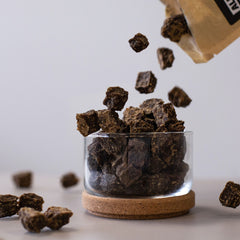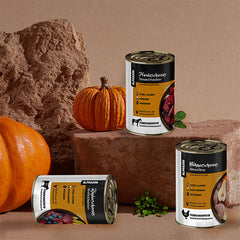Mango for dogs: An exotic treat for your four-legged friend?
Mango – the sweet, juicy tropical fruit is not only popular with humans, but could also be a hit with your dog. But can dogs eat mango? The short answer is: Yes, dogs can eat mango – but with some precautions. In this blog, you'll learn why mango can be healthy for dogs, how to prepare it properly, and what to look out for.
Can dogs eat mango? The short answer
Yes, dogs can eat mango as long as it's prepared properly. The fruit is rich in nutrients that can promote your dog's health. However, it's important to peel the mango and remove the pit, as these parts can be difficult to digest or even dangerous.
What is allowed?
- Ripe mango flesh without peel and stone.
What is forbidden?
- The peel and the core of the mango.
The benefits of mango for dogs
Mango is not only delicious, but also packed with valuable nutrients that can benefit your dog. Here are its key benefits:
1. Rich in vitamins
- Vitamin A: Promotes vision and strengthens the immune system.
- Vitamin C: Supports the immune system and has an antioxidant effect.
- Vitamin E: Promotes skin and coat health.
2. Antioxidants
- Mango contains antioxidants that fight free radicals and promote your dog's cellular health.
3. Fiber
- Supports digestion and helps with mild constipation.
4. Natural sweetness
- A healthy alternative to sugary treats.
5. High water content
- Mango helps maintain your dog's hydration, especially on hot days.
How many mangoes can dogs eat?
The right amount is crucial to reap the benefits of mango without harming your dog.
Recommended amount:
- Small dogs: 1–2 small pieces per week.
- Medium-sized dogs: 3–5 pieces per week.
- Large dogs: Up to 1/4 of a mango per week.
Risks and precautions for mango
Despite its benefits, there are some risks you should be aware of before giving mango to your dog:
1. Bowl
- The mango peel is difficult to digest and can cause gastrointestinal problems. It should always be removed.
2. Core
- The mango core is hard and can pose a choking hazard. It also contains traces of amygdalin, which can be converted into hydrogen cyanide in the body.
3. Overfeeding
- Too much mango can cause digestive problems or weight gain due to the high fructose content.
4. Allergies
- Some dogs are allergic to mango. Watch for symptoms like itching, diarrhea, or vomiting.
How do you properly feed your dog mango?
To ensure your dog can enjoy the mango safely, you should prepare it properly. Here are some tips:
1. Peel the mango
- Remove the shell completely as it is difficult to digest.
2. Remove core
- Carefully cut the mango to remove the hard core.
3. Cut into small pieces
- Cut the pulp into bite-sized pieces so your dog can easily eat them.
4. Offer in small quantities
- Start with a small amount to ensure your dog tolerates the mango well.
5. Use only ripe mangoes
- Make sure the mango is ripe and soft. Unripe mangoes are more acidic and can upset your dog's stomach.
Creative ways to prepare mango for dogs
Mango doesn't have to be boring! Here are some creative ideas for incorporating mango into your dog's diet:
1. Frozen mango pieces
- Perfect for hot days: Cut the mango into small pieces and freeze them.
2. Mango smoothie
- Puree mango with unsweetened natural yogurt and serve it as a refreshing snack.
3. Homemade dog treats
- Combine mango with oatmeal and peanut butter, form small cookies and bake them.
4. Mango in Kong
- Fill a Kong with mango puree and freeze it for a fun snack for your dog.
When should you not give your dog mango?
In some situations, mango is not suitable for dogs:
1. Diabetes
- Because of the natural fructose content, dogs with diabetes should eat no or very few mangoes.
2. Allergies
- If your dog has had an allergic reaction to other fruits, introduce mango with caution.
3. Sensitive stomach
- Dogs with sensitive stomachs may react to mango with diarrhea or flatulence.
Frequently asked questions about Mango for dogs
“Can puppies eat mango?”
Yes, puppies can eat mango, but only in small amounts and well chopped.
“Is mango poisonous to dogs?”
No, the flesh of the mango is not poisonous. However, the peel and pit should be avoided.
“Can mangoes cause diarrhea?”
Yes, if fed in excessive quantities, mangoes can cause digestive problems.
“Which fruits are still safe for dogs?”
Apples (without seeds), blueberries, watermelons (without seeds) and bananas are also safe fruits.
Conclusion: Mango for dogs – healthy, but in moderation
Mangos can be a healthy and delicious addition to your dog's diet when prepared properly and fed in small amounts. Key points at a glance:
- Safe: Only ripe mango flesh without peel and stone.
- Benefits: Rich in vitamins, antioxidants and fiber.
- Caution: Be aware of possible digestive problems or allergies.
With these tips, you can safely and confidently offer mango to your dog. Not only is it healthy, but it's also an exotic change that your dog will love!
















